| | | | | | | Presented By OurCrowd | | | | Axios World | | By Dave Lawler ·Mar 28, 2022 | | Welcome back to Axios World. - Tonight's edition (2,019 words, 7½ minutes) takes us all around the world, but it starts with the prospects for peace in Ukraine.
- For a deeper dive on that topic and some compelling interviews, please check out the latest episode of our "How it Happened" podcast. I'm a first-time host, so feedback is very welcome.
New arrival? Subscribe. | | | | | | 1 big thing: No clear path to peace | 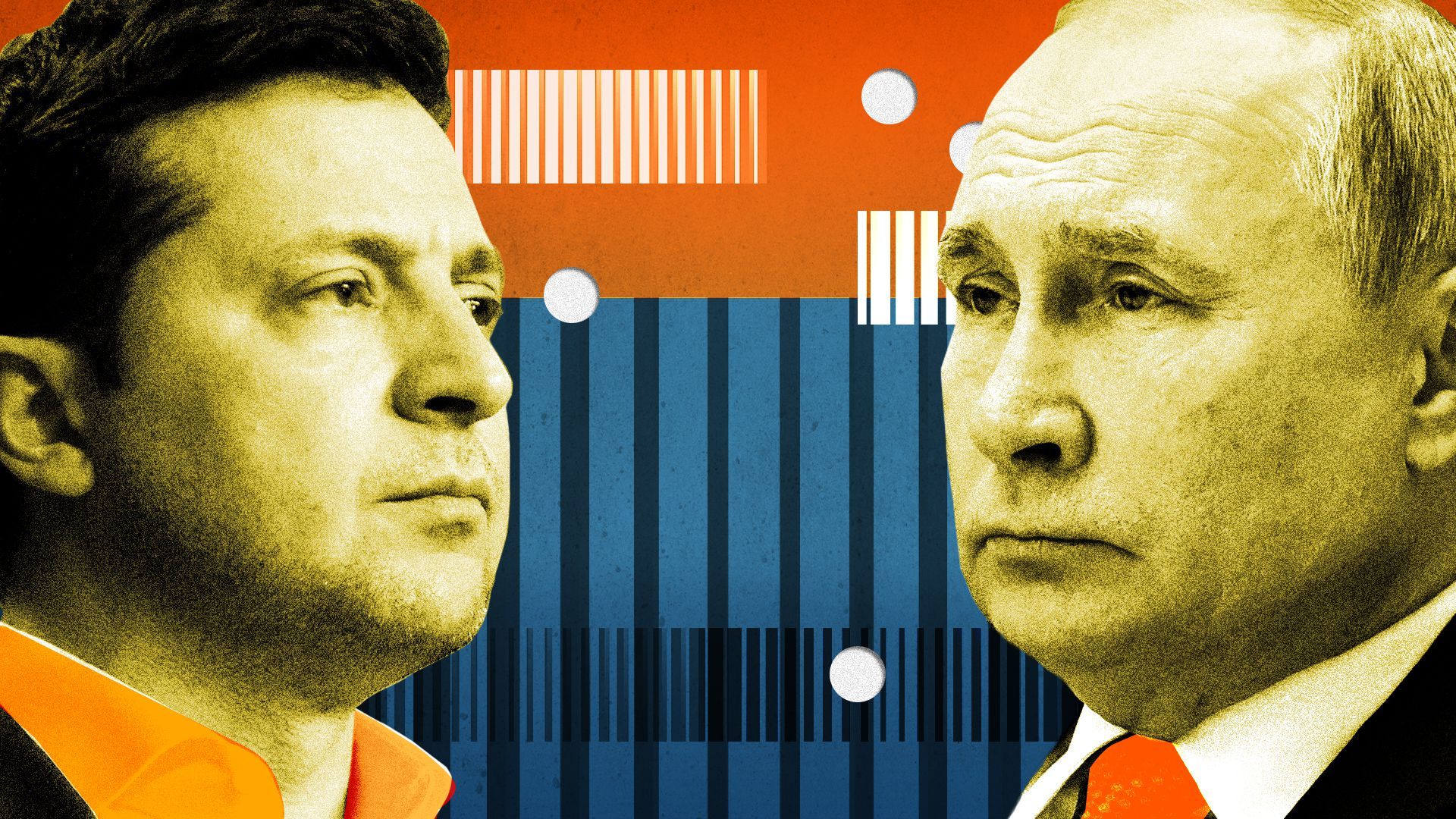 | | | Photo Illustration: Shoshana Gordon/Axios. Photos: Ukrainian Presidency/Handout/Anadolu Agency, Alexey Nikolsky/Sputnik/AFP via Getty Images | | | | Russian and Ukrainian negotiators are expected to meet tomorrow in Istanbul for another round of peace talks, but while there are rumblings of a potential ceasefire, the red lines remain far apart. The big picture: The scope of the fighting is narrowing, and both sides have signaled some flexibility on Ukraine's post-war status, yet analysts say this war is likely to keep raging and may become even bloodier. Driving the news: A member of Ukraine's delegation, David Arakhamia, told the FT that a draft agreement is coming together in which Moscow would drop its demand for "denazification" and objections to Ukraine joining the European Union if Kyiv rules out NATO membership. - Ukraine is willing to do that, he said, if it receives binding security guarantees from the U.S. and other foreign partners.
- The draft agreement puts off all territorial questions for potential future negotiations between Vladimir Putin and Volodymyr Zelensky, per the FT report.
Between the lines: NATO countries are wary of making any commitments to defend Ukraine, and Arakhamia noted that there are "unresolved points" with the Russians on other key issues. Russia has yet to define its terms for Ukraine's "demilitarization," for example. - Putin has been represented in the talks by relatively low-level officials and has reiterated his more maximalist ambitions in his own public statements, notes John Herbst, a former ambassador to Ukraine now at the Atlantic Council.
- Herbst doesn't think an agreement is likely anytime soon, as Putin has not shown he's serious and Zelensky — who has said any peace deal would require a referendum — is unwilling to "impose any concessions on his own people."
- Asked if a lasting peace with Putin is possible, Zelensky told the Economist, "I don't know if Putin even knows the answer to this question."
State of play: Russian officials now claim their objective is to "liberate" all of the eastern Donbas region, rather than take major cities like Kyiv. - But they're still demanding that Zelensky recognize the Russian-backed Donbas "republics" as independent and accept Russian sovereignty in Crimea — concessions Zelensky has repeatedly said he cannot make.
- The front lines across Ukraine are now largely frozen except in Donbas, where Russian forces are bombarding Mariupol and appear to be making gradual territorial gains. Elsewhere, attempted advances have been repelled, including outside Kyiv.
 Maryan Zablotsky, a member of parliament from Zelensky's party, told Axios that Ukrainians are focused on securing a military victory — which he believes is only a month or two away — rather than ceding to any of Putin's "totally irrational" demands. - Arguing that Ukraine's eventual victory is certain, Zablotsky said a friend of his is currently defending a position just 1 mile from his wife and 4-month-old child, while the family of any Russian soldier attacking that position is hundreds of miles away. "When he hears bullets whistling around him, what is his motivation to move forward?"
- Ukraine's success on the battlefield and in the global information war could actually make it harder for Zelensky to compromise, says Alexander Gabuev of the Carnegie Endowment.
- Even if Putin is starting to look for a way out of this war, he'll likely wait for a military breakthrough or, barring that, until the attention of the West begins to drift, says Sergey Radchenko of the Johns Hopkins School of Advanced International Studies.
What to watch: Putin could sell fairly minor concessions from the Ukrainians as a major victory given his control of domestic media, Gabuev says, but "having started such a terrible and reckless war, I think he will not settle for lesser prizes." - "The ugliest pages of this war are likely in front of us," he says.
|     | | | | | | 2. Suspicion and secrecy surround Ukraine talks | 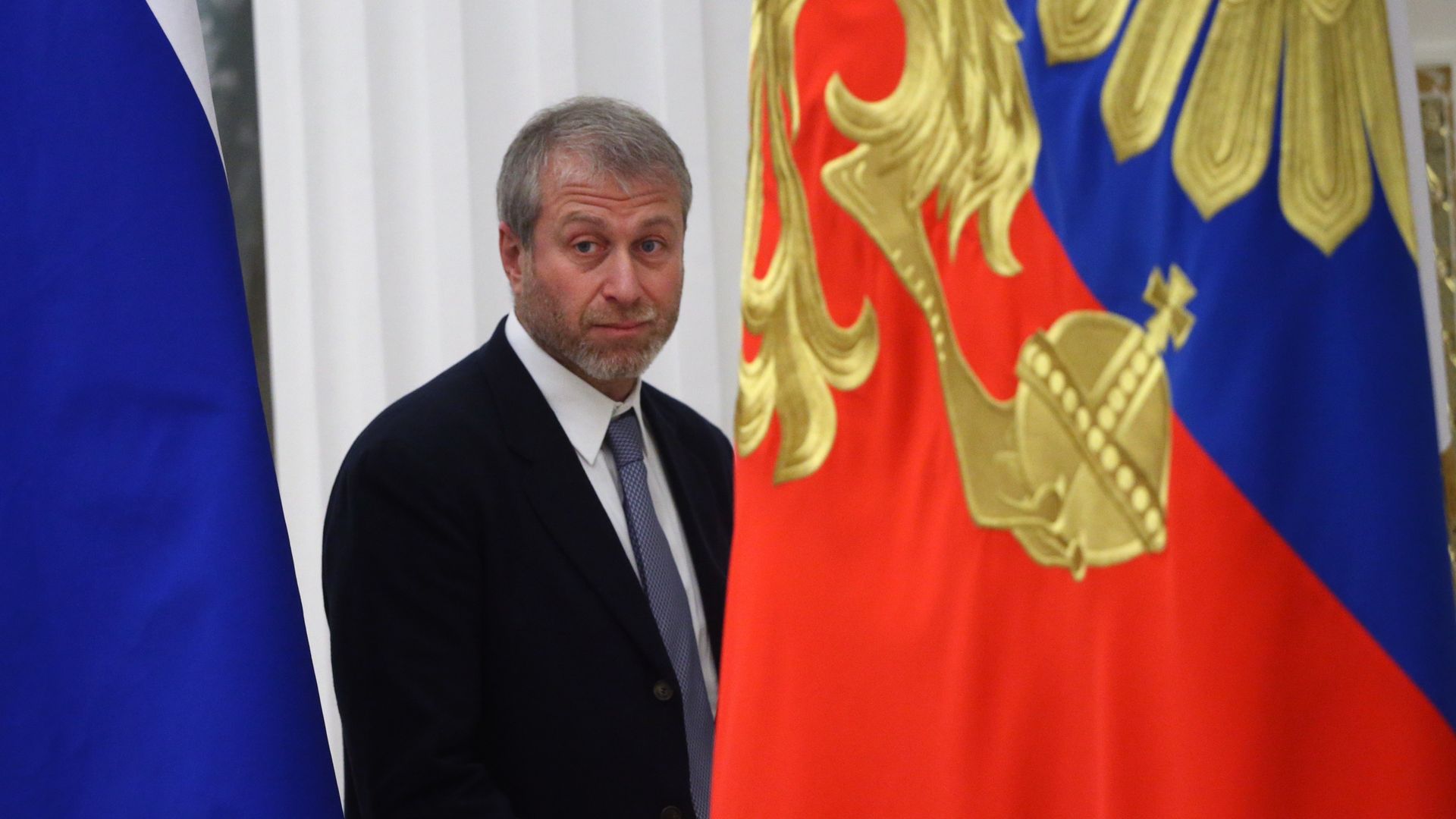 | | | Abramovich at the Kremlin in 2016. Photo: Mikhail Svetlov/Getty Images | | | | Reports today that Russian oligarch Roman Abramovich had experienced temporary blindness and other potential symptoms of poisoning while taking part in backchannel talks were the latest bizarre twist in a peace process that has been shrouded in suspicion and secrecy, Axios' Zach Basu writes. Catch up quick: The Wall Street Journal reported that investigators from Bellingcat had found that Abramovich and two Ukrainian negotiators fell ill at an apartment in Kyiv on the night of March 3, after a day of discreet peace talks. - They had consumed only chocolate and water in the preceding hours, according to Bellingcat's investigators, who suspected that a chemical weapon may have been used.
Yes, but: U.S. and Ukrainian officials seem to be pouring cold water on those reports. An unnamed U.S. official told Reuters that intelligence suggested an "environmental" issue was responsible for Abramovich's illness. - Ukrainian Foreign Minister Dmytro Kuleba also took a skeptical position during a TV interview, but added, "I advise anyone going for negotiations with Russia not to eat or drink anything."
- "All members of the negotiating group are working today as usual. There are a lot of information speculations, various conspiracy theories and elements of this or that information game in the information field now," lead Ukrainian negotiator Mykhailo Podoliak told Axios via WhatsApp.
Worth noting: Reports that another Ukrainian official, Denis Kireev, was killed earlier this month, days after taking part in peace talks, have yet to be fully explained. In other news… President Biden said this afternoon that his weekend statement that Vladimir Putin "cannot remain in power" did not reflect new U.S. policy, but was an expression of his "personal feelings" and "moral outrage." |     | | | | | | 3. Interview: Navalny won't be freed until Putin is gone, aide says | 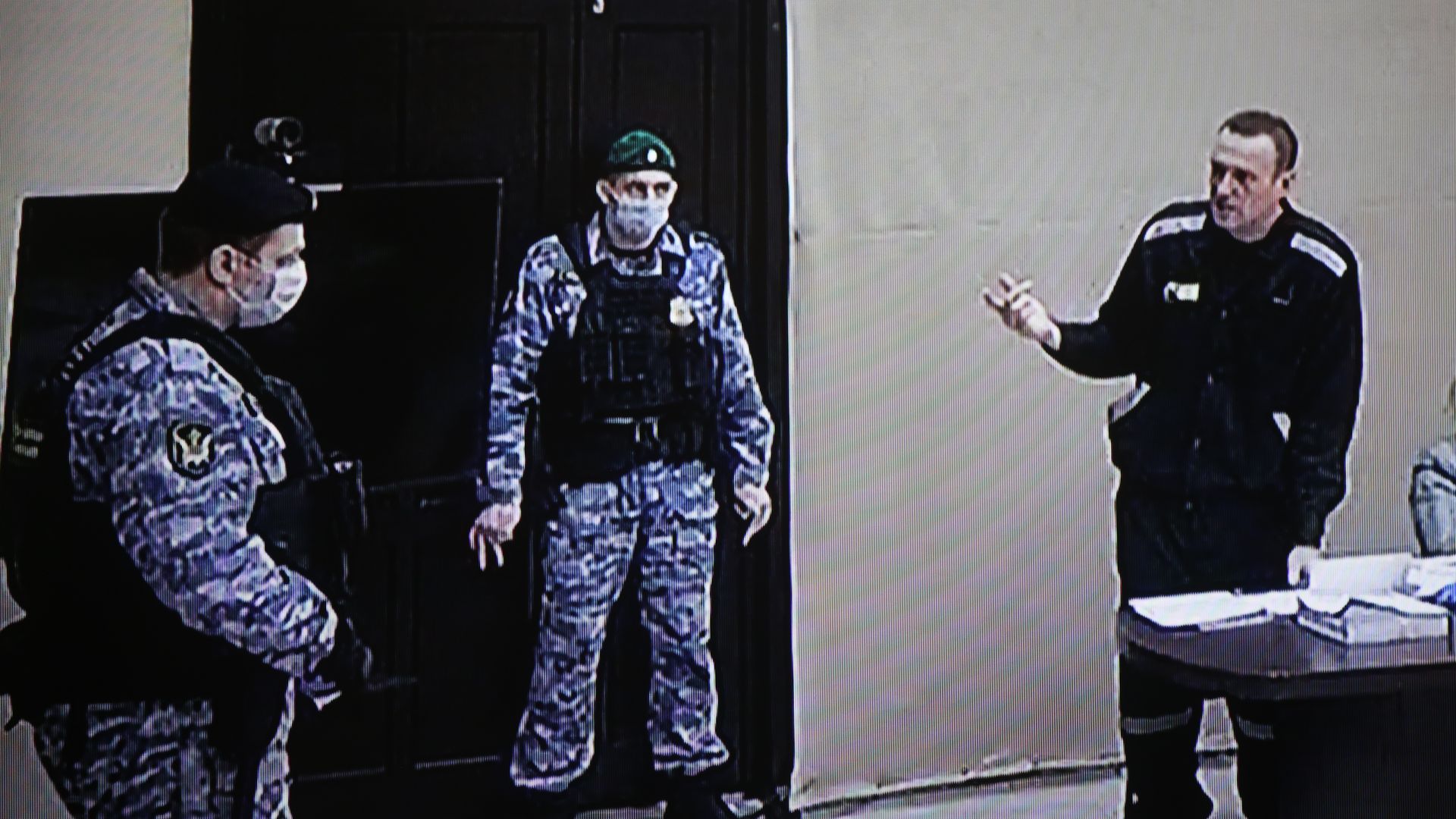 | | | Alexei Navalny appears in a court hearing at his penal colony. Photo: Mikhail Svetlov/Getty Images | | | | Russian opposition leader Alexei Navalny's new sentence — nine years in a more remote prison colony — could potentially endanger his life and sever his contacts with the outside world, according to Vladimir Ashurkov, the director of Navalny's Anti-Corruption Foundation. Driving the news: Navalny protested Putin's invasion of Ukraine in court and on social media before a judge handed down the sentence on fraud charges that were widely seen as politically motivated. - Navalny has been in prison since returning to Russia in January 2021 after recuperating from an assassination attempt by Russia's security services.
What he's saying: "Yes, we are dismayed by the sentence. But we knew that with Putin in power, it's unlikely that Alexei can get out. So it's important for us to continue our work," Ashurkov told Axios in a Zoom interview from London, where he lives in exile. - "He is thin, he is frail, but he is as fiery as ever," Ashurkov said of Navalny.
- The foundation continues to post investigations into the alleged wealth and corruption of Kremlin insiders, most recently of a $700 million yacht linked to Putin.
Up to now, Navalny's lawyers have been able to visit him at his prison colony outside Moscow for around an hour each day, during which time he could write and receive messages from his family and colleagues and help guide the work of his organization. - He will now be moved to a more secure and more remote facility. It's unclear whether he will appear regularly in court or have steady access to his lawyers — who were briefly detained following his sentencing on Tuesday.
- "This trickle of communication and information has been vital for us," Ashurkov said. "It's possible this will be taken away."
Asked about Navalny's personal safety, Ashurkov noted that he is himself in danger even in London. - "Nobody has any doubt that Russian security services can undertake assassinations in any part of the world. We've seen it in Germany, we've seen it in the U.K. So a Russian prison cell is not a secure place — it's probably the least secure place."
Go deeper. |     | | | | | | A message from OurCrowd | | Tech significantly lowers sugars in juice, reducing health risks | | | 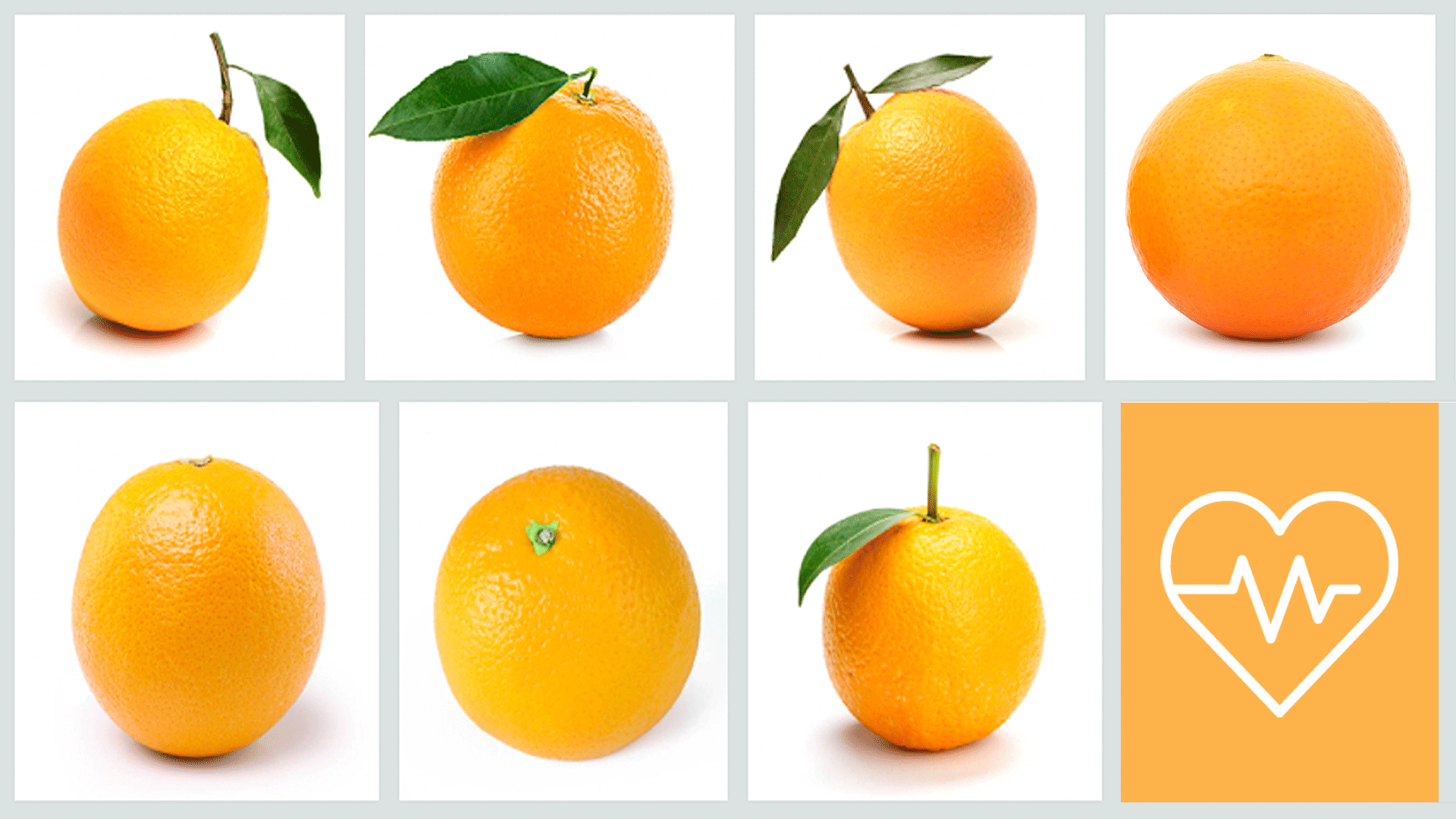 | | | | BlueTree has achieved what the juice industry has long dreamed of, dramatically reducing sugar without sacrificing taste. Sugar increases the risk of obesity, cancer and diabetes. BlueTree's revolutionary process cuts sugar in orange juice up to 30% and works on any natural liquid. Learn more. | | | | | | Bonus: Where in the world? | 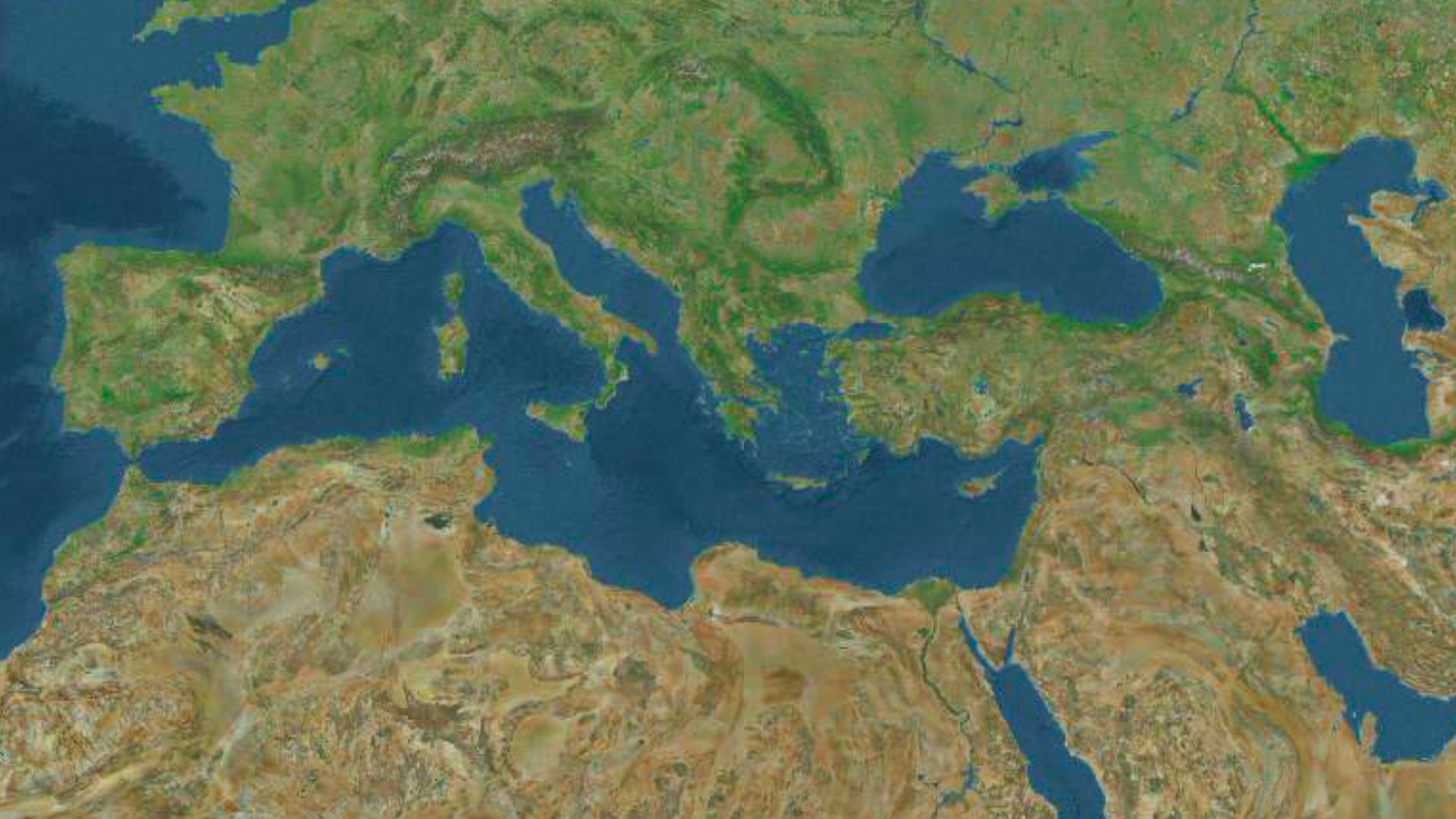 | | | Screengrab via Apple Maps | | | | Today we're visiting the Mediterranean coast. All of it. Can you name all 23 countries with a coastline on the sea? They include: - One partially recognized state, a city-state, two island countries, and an overseas territory of a country with a far-from-Mediterranean climate.
- Clue: There are four buckets of around five countries each — western Europe, Balkan countries, Middle East, North Africa — plus the two islands.
Scroll to the bottom for the answers. |     | | | | | | 4. Global news roundup | 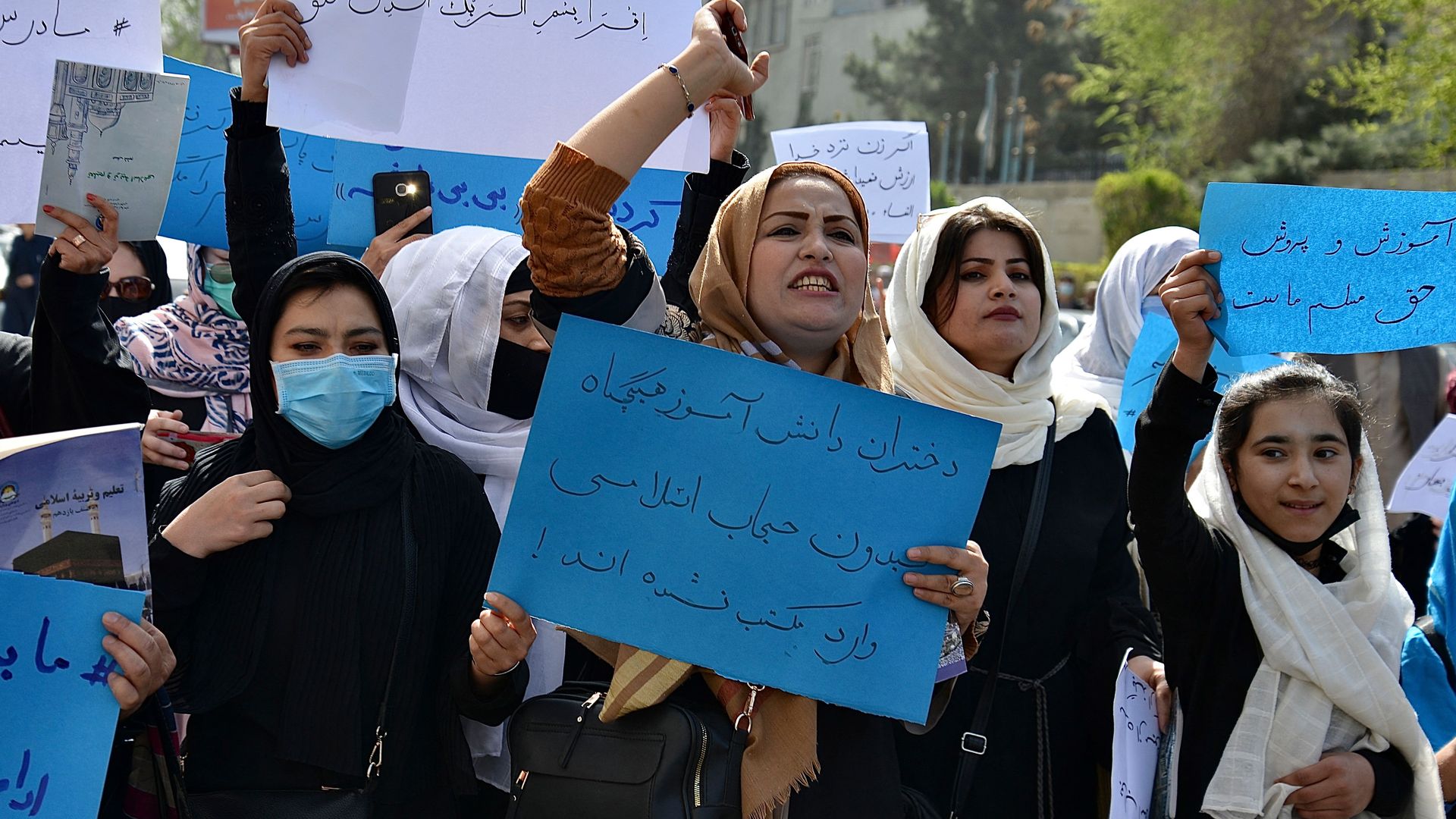 | | | Afghan women and girls protest in front of the Ministry of Education in Kabul demanding that high schools be reopened for girls. Photo: Ahmad Sahel Arman/AFP via Getty | | | | 1. Pope Francis on Monday met with Indigenous leaders from Canada who are seeking an apology from the Catholic Church for its involvement in running residential schools where Indigenous children were abused for decades, Axios' Noah Garfinkel writes. - What's next: The pope will have more meetings with Indigenous groups on Thursday and Friday. He has so far declined to apologize.
2. A new opposition party won 19 of the 28 parliamentary seats up for grabs on Saturday in Zimbabwe's first national election since the pandemic began. - What to watch: The Citizens' Coalition for Change looks like a formidable force heading into next year's general election, but Zimbabwe's previous elections have not been free and fair.
3. El Salvador is under a state of emergency after at least 62 people were murdered by gangs on Saturday. - State of play: Gang killings are now spiking after a relative lull. President Nayib Bukele last December denied claims from the U.S. government that he had effectively paid off gang leaders to reduce crime.
4. Afghan women and girls protested outside of the Taliban-run Education Ministry on Saturday after the government abruptly reversed plans to open schools to girls claiming it had yet to determine what uniforms they must wear. |     | | | | | | 5. What I'm reading: Imran Khan's fight to survive | 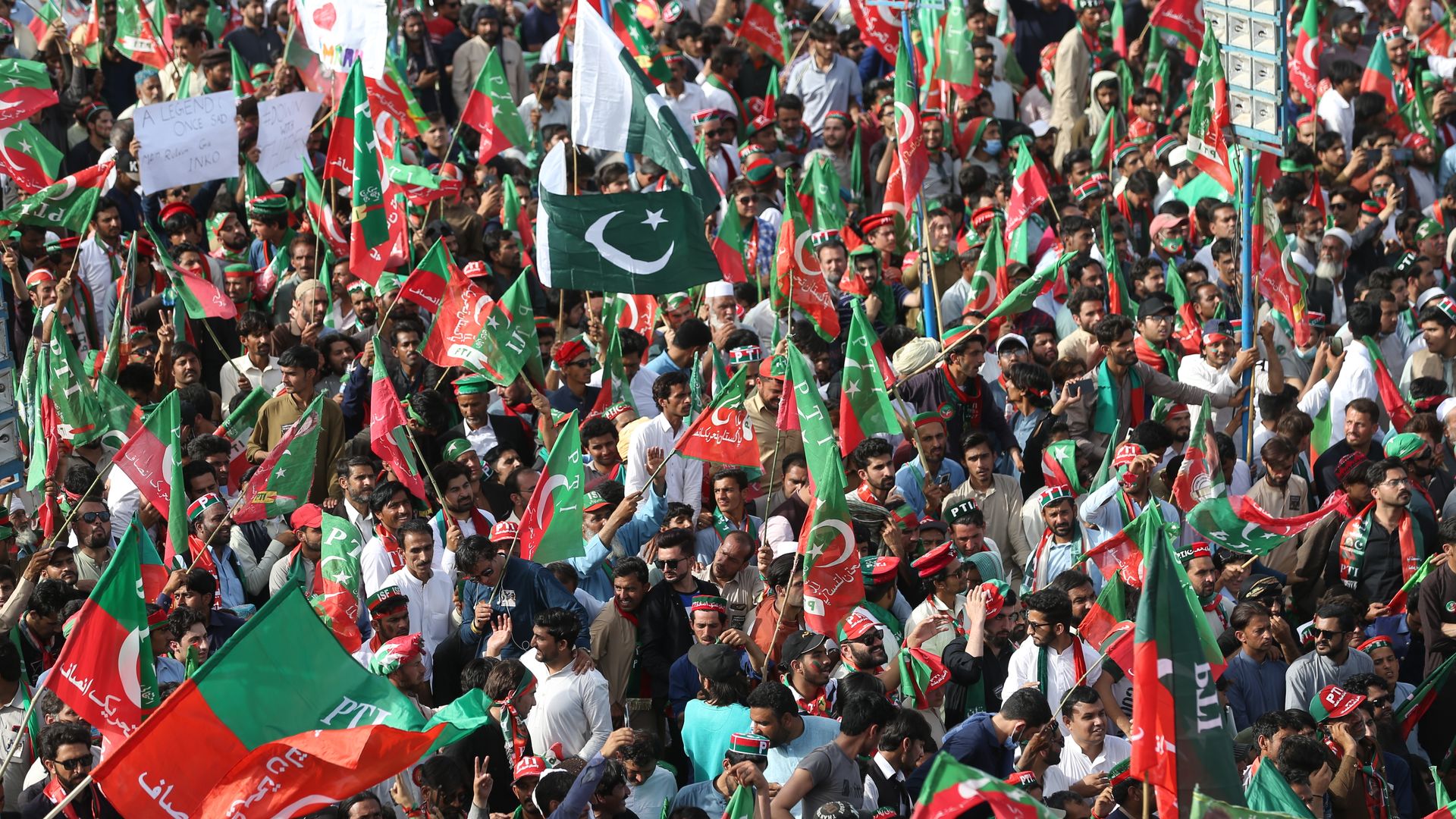 | | | Khan's supporters gather in Islamabad. Photo: Muhammed Semih Ugurlu/Anadolu Agency via Getty | | | | Pakistan's parliament took up a no-confidence motion against Prime Minister Imran Khan today, but not before the former cricket star held a political show of force with a massive rally Sunday in the capital. State of play: The polarizing PM doesn't currently appear to have sufficient backing in parliament to survive the vote, which will take place within seven days, due to defections in his party. But voters traveled from all over the country to show they still support him, the WSJ's Saeed Shah reports from Islamabad. - Khan claimed foreign forces are behind the effort to oust him and waved a folded piece of paper that he claimed contained a threat to Pakistan. "Even news anchors on sympathetic channels were left guessing what it was all about," Shah writes, but it seemed to be targeted at the West.
- The bigger threat to his hold on power is the military that helped him obtain it, Shah reports. "The current challenge against him is possible only because the military has remained neutral."
- Khan's aides say the military fears his increasingly anti-Western (and pro-China and Russia) politics will alienate Pakistan's quasi-allies in Washington, according to Shah.
What to watch: Khan is trying to mend ties with the military and could call for early elections, Shah writes. No previous prime minister has completed a full five-year term. Read the full WSJ story. |     | | | | | | 6. One to watch: Shanghai locks down | 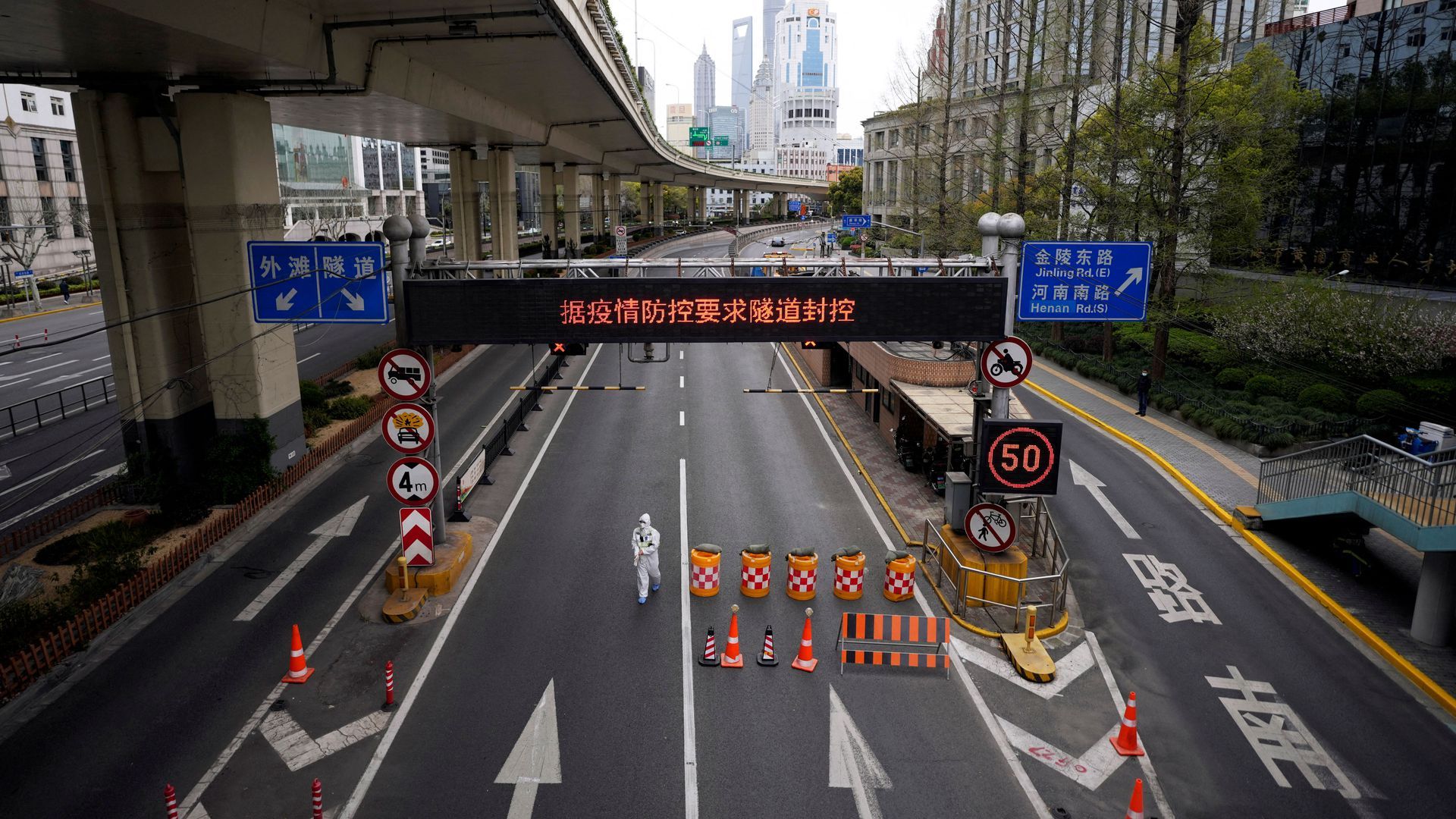 | | | A worker in a protective suit at the entrance to a tunnel leading to Shanghai's Pudong area on March 28. Photo: Aly Song/AP | | | | China on Monday began its most extensive lockdown in two years in the financial capital of Shanghai, home to 26 million. Why it matters: The move raises questions about the sustainability and economic toll of China's "zero COVID" strategy. - Shanghai's Pudong financial district will be locked down from today to Friday, per AP. On Friday, the downtown area will start its own five-day lockdown.
- Deliveries will be left at checkpoints to ensure there's no contact with the outside world. Panic buying was reported Sunday, with supermarket shelves cleared.
- China has been relying on mandatory mass testing of entire neighborhoods or cities to track outbreaks.
What to watch: Beijing faces a difficult longer-term decision as to whether and how to loosen the zero COVID approach, which has kept cases very low but has major ripple effects on the Chinese and global economies. - Only a small portion of the population has been exposed to the virus, and China's vaccines are less effective than Western alternatives.
|     | | | | | | 7. Stories we're watching |  | | | Fishermen try to lift a stranded boat on the Bay of Bengal in Teknaf, Bangladesh. Photo: Munir uz Zaman/AFP via Getty | | | - Kremlin censors Zelensky interview; Nobel winner's newspaper shuts down.
- Ice shelf collapses in East Antarctica for first time
- Great Barrier Reef bleaching
- Volcano forces evacuation in Philippines
- "Negev Summit" highlights Israel's new regional partnerships
- U.S., EU agree on transatlantic data rules
- What to know about Russia's hypersonic missiles
Quoted: "To denounce my country's dictatorship is not easy, but to keep silent and defend the indefensible is impossible. I must speak although I have fear. I must speak although my future and that of my family are uncertain." — Arturo McFields, Nicaragua's ambassador to the Organization of American States. He resigned his post after speaking out at a video conference. |     | | | | | | A message from OurCrowd | | Innovative FoodTech could reinvent the juice market | | | 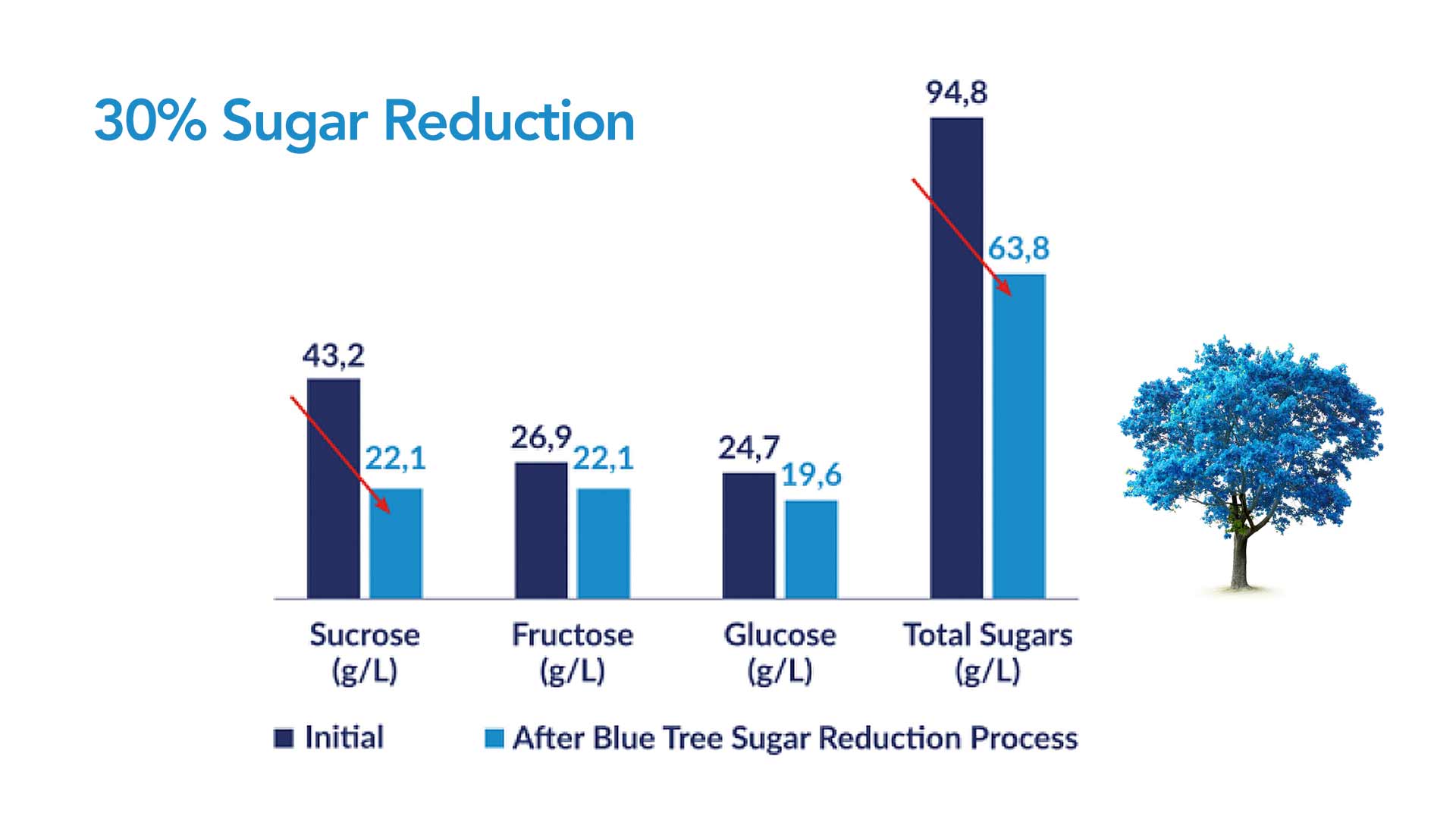 | | | | BlueTree's revolutionary process makes orange juice healthier without sacrificing taste by reducing sugar in orange juice up to 30%. Sugar increases the risk of obesity, cancer and diabetes. This process can be used on any natural liquid, including beer, wine and milk. Learn more. | | | | Answers, clockwise from the northwest: Spain, U.K. (Gibraltar), France, Monaco, Italy, Slovenia, Croatia, Bosnia and Herzegovina, Montenegro, Albania, Greece, Turkey, Syria, Lebanon, Israel, Gaza, Egypt, Libya, Tunisia, Algeria, Morocco, Malta, Cyprus. |  | It's called Smart Brevity®. Over 200 orgs use it — in a tool called Axios HQ — to drive productivity with clearer workplace communications. | | | | | | Axios thanks our partners for supporting our newsletters. If you're interested in advertising, learn more here.
Sponsorship has no influence on editorial content. Axios, 3100 Clarendon Blvd, Suite 1300, Arlington VA 22201 | | | You received this email because you signed up for newsletters from Axios.
Change your preferences or unsubscribe here. | | | Was this email forwarded to you?
Sign up now to get Axios in your inbox. | | | | Follow Axios on social media:    | | | | | |














No comments:
Post a Comment